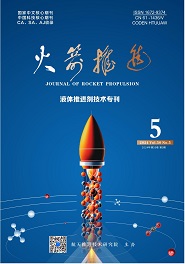航天推进技术研究院主办
WAN Yilun,FU Xinyu,ZHANG Lihui,et al.Simulation analysis on operating characteristics of gas-filled accumulator system[J].Journal of Rocket Propulsion,2018,44(03):37-42.
注气式蓄压器系统工作特性仿真分析
- Title:
- Simulation analysis on operating characteristics of gas-filled accumulator system
- 文章编号:
- 1672-9374(2018)03-0037-06
- 分类号:
- V434-34
- 文献标志码:
- A
- 摘要:
- 以大型运载火箭POGO稳定性为研究背景,针对国内尚无型号应用的注气式蓄压器开展仿真研究。在建立注气式蓄压器动力学模型的基础上,利用航天飞机主发动机的相关参数验证了仿真计算的准确性。仿真计算了蓄压器对推进系统固有频率的影响和四种不同蓄压器的推进系统频率特性。研究了注气流量、注气温度、排气流量和排气时间对蓄压器工作特性的影响。仿真结果表明,随着蓄压器入口压力的增大,溢流孔靠近底部的蓄压器气枕压缩量减小; 注气式蓄压器比贮气式蓄压器能够更有效地避免推进系统频率与箭体结构频率相交。
- Abstract:
- With the POGO stability of a large launch vehicle as research background, the simulation analysis of a gas-filled accumulator was carried out without any application in China. On the basis of building the dynamic model of a gas-filled accumulator, the accuracy of simulation was validated by using the relevant parameters of the space shuttle main engine. The influences of the accumulator on the natural frequency of a propulsion system and the frequency characteristics of propulsion systems of four different pressure accumulators were calculated. The effects of injection flow rate, injection temperature, venting flow rate and venting time on the dynamic characteristics of accumulator were investigated. The simulation results indicate that the compression capacity of the accumulator's pneumatic die cushion at the bottom of overflow holes decreases with the increase of the inlet pressure. Besides, the gas-filled accumulator can more effectively avoid the intersection of propulsion system frequency and vehicle structural frequency in comparison with traditional accumulator. The research results have a certain reference significance for the development of gas-filled accumulator.
参考文献/References:
[1] 黄怀德. 液体火箭的POGO振动[J].国外导弹与宇航, 1980(1): 27-35.
[2] 黄怀德. 液体火箭的POGO振动研究[J].振动工程学报, 1987(1): 9-17.
[3] 靳爱国. 蓄压器对发动机试车液路固有频率影响分析[J].火箭推进, 2005, 31(05): 15-18.
JIN Aiguo. Effect of buffer on frequency of engine flow system in hot tests[J].Journal of rocket propulsion, 2005, 31(05): 15-18.
[4] 廖少英. POGO 蓄压器变频降幅特性分析[J].上海航天, 2002, 19(1): 32-35.
[5]黄怀德. 蓄压器的作用及其设计和实验[J].国外导弹技术, 1980, 9: 006.
[6] LARSEN C E. NASA Experience with Pogo in Human Spaceflight Vehicles[J].Johnson space center Rept Rto, 2008.
[7] DOTSON K. Mitigating Pogo on liquid-fueled rockets[M].Crosslink, 2003.
[8] 司徒斌, 高普云. 低温运载火箭POGO抑制系统研究[J].低温工程, 2006(2): 58-64.
[9] 王小军, 于子文, 张兵, 等. 国内外运载火箭 POGO抑制技术研究进展[J].中国科学: 技术科学, 2014, 5: 007.
[10] SWANSON L A, GIEL T V. Design Analysis of the Ares I Pogo Accumulator[C]//AIAA Joint Propulsion Conference & Exhibit. Denver: [s.n.], 2009.
[11] COPPOLINO R N, LOCK M H, RUBIN S. Space shuttle POGO studies[R].Aerospace Corp, AII-78(7474)-1, 1977.
相似文献/References:
[1]曹 伟,许映乔,魏彦祥,等.嫦娥三号推进系统在轨推进剂耗量计算方法[J].火箭推进,2015,41(01):63.
CAO Wei,XU Ying-qiao,WEI Yan-xiang,et al.Method of onboard propellant consumption calculation
for Chang'e-3 propulsion system[J].Journal of Rocket Propulsion,2015,41(03):63.
[2]刘锋,申智帅,王波,等.气动增压空间推进系统及相关技术试验研究[J].火箭推进,2017,43(06):38.
LIU Feng,SHEN Zhishuai,et al.Experimental study on pneumatic pressurization space propulsion system and its correlation technology[J].Journal of Rocket Propulsion,2017,43(03):38.
[3]韩 伟,王永忠,单世群,等.氧化亚氮基氧燃一体化推进剂及推进系统研究进展[J].火箭推进,2020,46(05):1.
HAN Wei,WANG Yongzhong,SHAN Shiqun,et al.Research progress of nitrous-oxide-based oxidizer-fuel integrated propellant and propulsion system[J].Journal of Rocket Propulsion,2020,46(03):1.
备注/Memo
收稿日期:2018-01-02
作者简介:万屹仑(1992—),男,硕士研究生,研究领域为液体火箭发动机系统仿真
